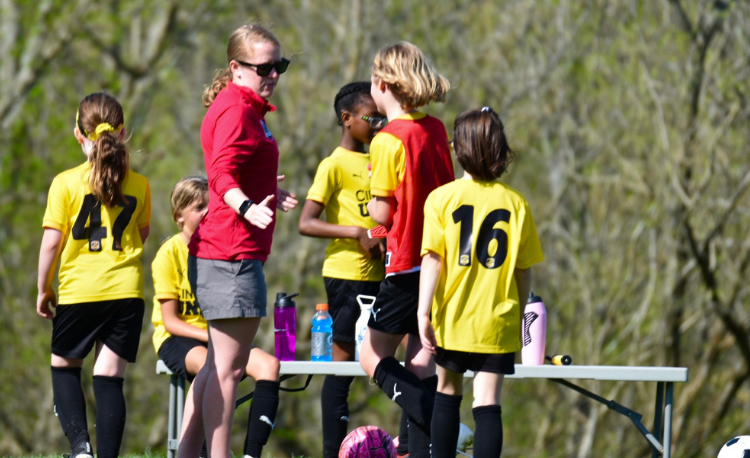You are viewing
1 of your 3 free articles
Identify and address performance anxiety
Kate Walsh, studying for a Masters degree in sport and exercise psychology, outlines the contributory factors to psychological issues that can affect players.
Performance anxiety is a psychological phenomenon which can affect any soccer player, amateur or professional.
It is a specific type of anxiety, which can be detrimental to both wellbeing and performance, often arising when a player feels stress or pressure in competitive scenarios.
An estimated 2% of individuals suffer from performance anxiety, but specific figures for female soccer players are so far unknown.
A baseline level of anxiety is to be expected, and sometimes even enhances performance through its contribution to arousal levels, readiness and motivation. However, when this anxiety is felt in excess, concerns can arise.
What contributes to performance anxiety?
Factors that can influence this phenomenon include progressing to a higher level of the game or playing up an age-group at youth level.
The responsibility felt by players can increase, along with the fear of falling short of raised expectations. This pressure often leads to performance anxiety.
Fear of failure is another common trigger. The anticipation of missing desired targets can cause great psychological stress to players.
"Fear of failure is a common trigger. It can cause great psychological stress..."
Negative thought patterns can also create a cycle of self-doubt and anxiety, having a negative impact on confidence and self-esteem.
This can create a psychological barrier which interferes with players’ ability to perform at optimal levels.
Female-specific factors
It is also important to pay attention to factors specific to the women’s game which may also be exacerbating performance anxiety on the pitch.
Social pressures
High levels of physicality and assertiveness are demanded of soccer players on the pitch – traits considered typically ‘masculine’ by wider society. Herein lies the paradox.
Research has suggested that, while male players are often urged to also embody these characteristics off the pitch, female players may only be encouraged to exhibit them while participating in sport – or, perhaps, not at all. As such, big differences in social pressures are placed on men and women, with femininity and masculinity viewed as polar opposites.
Although female players are more empowered than ever in terms of taking ownership of what being a woman means to them, outdated stereotypes can linger.
They can also be more prominent for some compared to others. This can cause them to feel conflicted between their perceived roles within sport and society, creating divisions in their own identity.
This is where we need more research into how managing these social pressures can alleviate performance anxiety.

Body image
Though concerns relating to body image exist for all genders in sport, they can be particularly pronounced for female athletes.
In certain cases, female players may have concerns about fitting in with the traditional image of femininity, potentially contributing to on-pitch anxiety as they partake in a physical, and therefore stereotypically masculine, sport.
Recent research suggests that soccer players who are more dissatisfied with their body image can also display higher levels of anxiety, on and off the pitch.
This can negatively impact not only performance, but an individual’s overall wellbeing. This is because body image concerns about increased muscularity and body size may come into play, despite athletes typically being in peak physical condition to perform at the top level.
Gender bias
With there being generally less investment in the women’s game than the men’s, environmental pressures may differ between genders.
For instance, reduced financial stability can increase both general and performance anxiety, as players feel greater pressure to play well to retain their place in the starting line-up and, ultimately, their financial income.
This pressure is, of course, also present in the men’s game. However, the fewer opportunities for full-time contracts in the women’s game, plus lower pay, ultimately means less financial security for female players in general. This may be a source of increased concern and anxiety when playing the game that used to be ‘just for fun’.
It is important to remember that the above are generalized considerations.
Not all players will experience performance anxiety, and, of those who do, it could be for many other reasons. Influences such as individual experiences, personality, role in the team and support system, among many others, also hold significance.
SO, HOW CAN YOU BEST SUPPORT YOUR ATHLETES?
How to spot the signs
Changes in performance/technique
Monitor any changes in how they perform from their typical baseline, such as hesitation in decision-making or uncharacteristic errors.
Observation
Keep a keen eye on changes in body language before, during and after matches and practice.
Communication
Ensure you have open avenues of communication with players, allowing them to express self-doubt when they experience it.
How to address performance anxiety
Typically, this involves a combination of approaches, depending on the individual in question and what is likely to work best for them. There is no one-size-fits-all solution, with performance anxiety something to be managed, not solved.
Check-in regularly with your players
This keeps that line of communication open and lets them know you are always there to listen. It can also contribute to building a culture where your athletes feel comfortable expressing when they are struggling.
Goal-setting and positive reinforcement
These two tools go hand-in-hand. Helping your players to make clear, short-term goals can provide quick wins that will contribute to both their immediate confidence and overall development. By providing ample positive feedback, this can improve self-esteem, which has been linked with performance anxiety.
Recognize your limits
If a player’s performance anxiety develops beyond the scope of your support, then a referral to a sport psychologist or mental-health professional may be the most appropriate course of action. These experts can provide specialized interventions to address the psychological aspects of performance anxiety.
Related Files
Newsletter Sign Up
Newsletter Sign Up
Discover the simple way to become a more effective, more successful soccer coach
In a recent survey 89% of subscribers said Women's Soccer Coaching makes them more confident, 91% said Women's Soccer Coaching makes them a more effective coach and 93% said Women's Soccer Coaching makes them more inspired.
*includes 3 coaching manuals
Get Inspired
All the latest techniques and approaches
Women's Soccer Coaching offers proven and easy to use soccer drills, coaching sessions, practice plans, small-sided games, warm-ups, training tips and advice.
We've been at the cutting edge of soccer coaching since we launched Soccer Coach Weekly in 2007, creating resources for the grassroots youth coach, following best practice from around the world and insights from the professional game.







